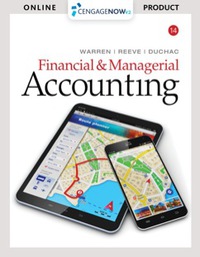Question
Case: Jhon McDonald Jhon McDonald is a production manager of a company that manufactures machine parts for a heavy machinery firm. Jhon joined the company
Case: Jhon McDonald
Jhon McDonald is a production manager of a company that manufactures machine parts for a heavy machinery firm. Jhon joined the company 12 years back and introduced a performance-based payment system in the company. A performance-based payment system is not very common in manufacturing industries in that locality. In this system employees are paid based on number of units they produce, and the quality of the units produced. Employees are paid below average hourly pay but high bonuses. Therefore, efficient employees are earning above average salaries. Employees with long time experience receive salaries from $80,000 - $90,000. Most experienced employees liked the system because they are earning very good remuneration and they can personally influence their salaries.
However, some employees do not like this system because they are not able to keep up with the intensive production methods and they want more payment security. In addition, they are critical that there are no health plans incorporated in this payment system. A paid annual leave clause is also missing from the system. However, employees are able to take leave, but they are not paid. Employees who do not like this system ultimately leave the company.
Ron Freeman and his five friends have worked for the company for the last 10 years. They like the system as they are earning very good salaries and happy that their experiences and efficiencies are rewarded. However, Uka Ahamed and three of her friends are very unhappy about this pay system. They joined the company two years back and feel that the pay system is unfair to them.
Case: Rick Bob
Rick Bob is a partner in a public accounting practice. His practice is popular with the local community because his senior partner is local. One of Ricks clients, an elderly businessmen called Rob Greenwater insists that Rick always comes to his office to discuss his financial arrangements. While there, Rob always insists on sharing coffees with Rick while they discuss business.
Rick has realised for a long time that this is normal with this client. He is very proud of his firm, his staff and the fact that the firm was still earning good fees. Part of Ricks success is the effort he has put into nurturing the relationship with Rob. Due to this relationship Rob always felt comfortable with Rick and his accountants.
However, there was a negative side to this approach. Ricks firm has become more dependent on Robs business. Rick observed that Rob has been becoming more demanding, and Rick is concerned about the issue. In the past Rob overruled Ricks accountants on small matters. Currently one junior accountant from Ricks firm identified a window dressing issue in Robs accounts and discussed the issue with Rob. Rob was unhappy about it and called Rick and demanded that Rick should accept the accounts presented by Rob. Rob tells Rick that he has an exciting new business venture in the pipeline and will tell him all about it at his next visit and is planning to appoint Ricks accounting practice to manage the accounts of the new venture as well. Rob insists that Rick visit his house for dinner one night, where he will discuss the new business in detail.
What you have to do?
Part A: Applying theories of ethics (1,000 words max)
You must undertake independent research into the theories of egoism, and utilitarianism. Now apply them as follows assuming that you are an expert in business ethics.
- Analyse the ethical issues of Jhon McDonalds case using the theory of egoism.
- Analyse the ethical issues of Jhon McDonalds case using the theory of utilitarianism.
In each case, you must identify the key features of the theory being used and show how they apply to the case. Conclude the section by explaining how a theoretical knowledge of ethics will help Jhon deal with the ethical issues.
Part B: Using an ethical decision-making model (500 words max)
Take Rick Bob through the AAA decision-making model step-by-step and arrive at the best ethical outcome for him.
Part C: Using APES 110 (1,000 words max)
Rick Bob is a Chartered Accountant and so are the accountants in the firm, and therefore APES 110 applies to all of them.
Advise Rick Bob of the provisions of APES 110 that are relevant here, especially the fundamental principles, types of threats and relevant safeguards. Advise Rick Bob of what he must do to be compliant with APES 110.
Step by Step Solution
There are 3 Steps involved in it
Step: 1

Get Instant Access to Expert-Tailored Solutions
See step-by-step solutions with expert insights and AI powered tools for academic success
Step: 2

Step: 3

Ace Your Homework with AI
Get the answers you need in no time with our AI-driven, step-by-step assistance
Get Started


